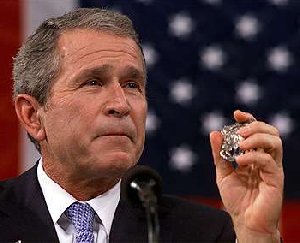

Telephone Interview with President George W. Bush, February 14, 2002, by the Student Knud-Erik Bornhardt
The student (Knud-Erik)
Q:
Mr. President, I feel honored to have this exclusive interview about the
environment, and I will start with the ultimate question, "What do you think are
the biggest environmental problems in the world?"
Bush A:
It is a
difficult question. I think the increasing of the people on the earth is the
biggest problem because it will increase the problems to make foot enough
without too much fertilizing, it will increase the amount of waste, and it will
increase the use of energy.
The student Q:
What
do you think will happen if we use too much fertilizing at the
fields?
Bush A:
First of all
there is a risk we are going to pollute our ground water. Secondly we will have
problems to produce food, which is healthy for people to eat, and in the end,
but also important, there will be a big risk we are going to destroy the living
place for a lot of animals, birds and reptiles.
The student Q:
How
can we stop the increasing of the people on the earth?
Bush A:
It isn't
easy. In most of the undeveloped countries the families' ability to survive
depends on the amount of children. It is the children who will take care of the
old family members. There are no departments for social services in these
countries. It means we have to start with education both for the women to
decrease the amount of births and to give the families better possibilities to
survive without this big dependence of the children.
America and the world
share this common goal. We must foster economic growth in ways that protect our
environment. We must encourage growth that will provide a better life for
citizens, while protecting the land, the water, the air that sustain
life.
The student Q:
What
will US actually do for the environment?
Bush A:
I am glad for
that question. Then I have the possibility to unveil my program directly to the
ESL class at Red Rocks Community College. We will have a series of tax credits
and other incentives to encourage business and farmers to reduce harmful
emissions, which I rejected last year after the Kyoto treaty.
Our goal is to
reduce greenhouse gas emissions 4.5 percent in the U.S. by 2012 while the Kyoto
treaty only demand us to reduce greenhouse gas emissions 5.2 percent overall,
and 7 percent in the U.S., by 2012
The student Q:
How
will the industry participate in your program?
Bush A:
We will set
voluntary goals, allowing businesses to decide whether or not to participate in
this program while the treaty from Kyoto sets mandatory goals for the reduction
of greenhouse gas emissions, as applied to about 30 of the most developed
nations
The student Q:
The
Kyoto treaty allows nations to buy or sell carbon credits on the international
financial market or reduces their quota by expanding forests or farmland that
absorb carbon dioxide from the atmosphere. How will you incentive the industry
into this program?
Bush A:
We will urge
businesses to voluntarily reduce emissions by providing tax incentives to those
that invest in and effectively utilize "clean" technology.
The student Q:
You
have called the Kyoto agreement, which 178 other nations accepted last year, an
"unsound international treaty." You said you could not support it because it
would result in deep cuts in the American economy and the loss of 4.9 million
jobs. You have changed your politic. How much are US now ready to reduce the
greenhouse gases?
Bush A:
My plan will
prevent the release of about 500 million metric tons of greenhouse gases, the
equivalent of 70 million cars from the road. It is our goal that the United
States will cut the intensity of greenhouse gas emissions by 18 percent over 10
years. This means that emissions will still continue to grow, but at a lower
rate.
Under a separate plan called the "Clear Skies Initiative," the
emissions from sulfur dioxide will be cut by 73 percent, nitrogen oxides by 67
percent and mercury by 69 percent, all by 2018.
The student Q:
How
will you describe this step in the environmental program in the
USA?
Bush A:
I will say,
this legislation will constitute the most significant step America has ever
taken, to cut power plant emissions that contribute to urban smog, acid rain,
and numerous health problems for our citizens. I will conclude by saying:
-
We will cut the power plant emissions of nitrogen oxides, sulfur dioxide and
mercury
- We will improve air quality with market-based approach
- We will
cut greenhouse gases
- We will support more research
- We will support
American workers
- We will include developing world
The student Q: How much will this plan cost?
Bush A:
My plan
includes $4.5 billion in next year's budget for global climate change programs,
a $700 million increase over this year's budget.
This money includes the
first year of funding for a five-year, $4.6 billion program for tax credits for
businesses pursuing renewable energy sources.
The student Q: Thank
you. We are looking forward to see the result in the environment in USA and in
the world.